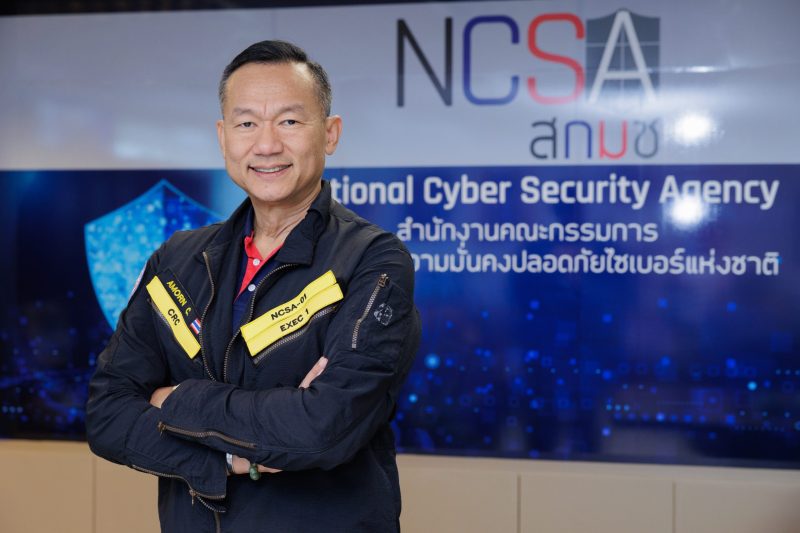Cybersecurity has become one of the hot topics for everyone around the world as it could cause a serious problem at almost unimaginable scale in both public and private sectors at a brink of an eye. Since most of our data has already been recorded and kept digitally, it can be said that digital is a part of everyone’s life at the moment. Meanwhile, the National Cyber Security Agency (NCSA) has been pushing for an improving cybersecurity standard in Thailand as the online world touches people’s lives in so many aspects, ranging from digital version of personal information, the heavy penetration rate of social media usage and even with the new norm of online banking via applications and various digital wallets which resulting in more and more online identity and footprints. One of the efforts from the NCSA is to incubate the new generation of digital talents so the country will be ready for any cybersecurity trends that arise with opportunities and challenges. It also has been pursuing this goal by working in partnership with a global leading technology provider such as Huawei to speed up the tasks to help elevate the cybersecurity standard for Thailand.
When asked about the definition of cybersecurity, AVM. Amorn Chomchoey, Secretary General at National Cyber Security Agency said that “To put it simply, we can divide cybersecurity into three categories: privacy of personal information, safeguard of our personal information, and the readiness of access our personal information at any time. Our goals are to make sure that the standards for all three categories are met. We can do that by trying to eliminate the threats, which can also be divided into three main types: stealing or leaking of information, online fraud which often effect the general users and involve financial losses, and the lack of cyber wellness or cyber hygiene i.e., online bullying or any threats via online channels. The last category is important because we need to make sure that we know how to use digital tools for positive benefits and manage the usage time effectively.”
AVM. Amorn Chomchoey believes that we need to be proactive when it comes to the topic of cybersecurity and the holistic safety approaches can be implemented quickly if we are one step ahead of the threats. The NCSA has been proactively put many policies in place in order to minimize the possibility of any cyberthreats happening to any major public systems and infrastructures, which could cause a disruption of the public service to Thai people, and to make sure that we can maintain safety and privacy of the information. He also points out that good cybersecurity should start from the system design and the system itself should be delivered from a trustworthy supplier. Safety protocols during the usage or implementation process should be in constant scrutiny so that any potential threats can be spotted right away. If we have enough digital talents in every sector who are well equipped with the necessary skills, we will be able to handle this issue very effectively.
“We always say that we have around 460,000 government officers across the country, but only 0.5% of that number are IT talents, so it is necessary for us to develop related IT skills for our staff. With that objective, we have been partnering with Huawei Technologies (Thailand) Co., Ltd. to host the Thailand Cyber Top Talent program for three consecutive years as NCSA and Huawei share the same goal when it comes to development of IT skills for the new generation of workforce in Thailand. Huawei has been supporting us in many aspects for the event, ranging from logistics to providing related knowledge and skills which include coding skills that are necessary to achieve a network engineer certificate. The NCSA is aiming to develop a long-term framework for digital talents incubation as we believe that human resource development is essential. We are also in talks with Huawei to develop even more experts in Cloud Security field. At the moment, we are finalizing the appropriate process and how to best utilize those talents in the future. We hope to train 5,000 IT talents and then select some Cloud experts to serve in related industries or organizations as their skills will be crucial for both public and private sectors.” AVM. Amorn Chomchoey added.
He further added that the partnership between the NCSA and Huawei is not exclusive to the government officers, as he has seen that the private sector is also facing shortage in digital talents and those with sufficient cybersecurity skills. The NCSA will continue to partner with Huawei to expand on incubation programs for digital workforce in order to locate the talents across the country who are passionate in this area and put them on the path to success. The agency hopes this can lead to develop other cybersecurity projects for Thailand.
The recent Thailand Cyber Top Talent 2023, which was hosted for the third consecutive year is another successful result of the partnership between the NCSA and Huawei Technologies (Thailand) Co., Ltd. The event was considered the biggest Cybersecurity competition event in the country and had more than 2,000 attendees, which is double compared to the previous year. Huawei shares the same value on cybersecurity as the NCSA and it has been working with various organizations, public and private, in strengthening the digital workforce for the country by introducing various projects to elevate knowledge and skills in related fields. It believes this will increase the competitiveness for Thai businesses and government agency and to better prepare for any cybersecurity threats in the future, which is in line with its “Grow in Thailand, Contribute to Thailand” mission, aiming to support Thailand in becoming the digital hub of the region.
